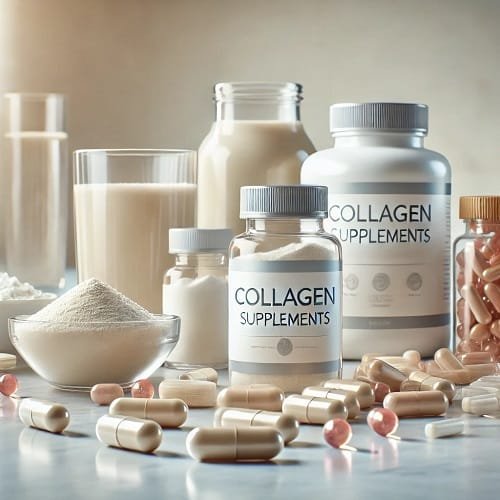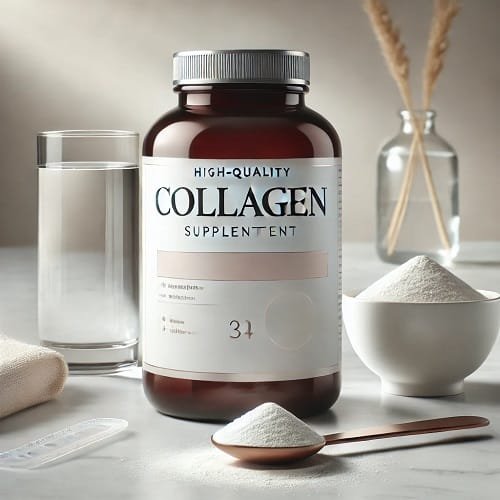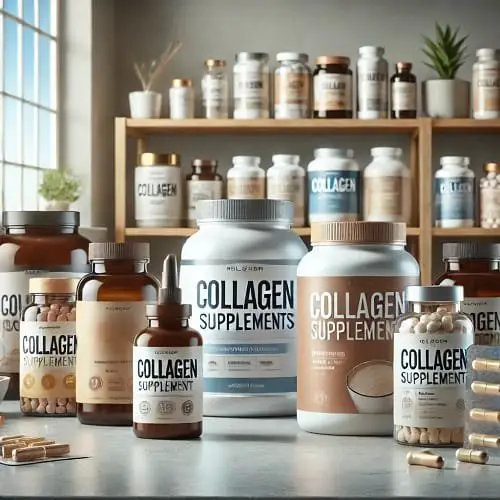What is Collagen and How Does It Benefit Your Body?
Is it safe to take collagen while breastfeeding? Collagen is a vital protein that plays a crucial role in maintaining the structure and health of various parts of the body, including the skin, hair, and joints. As the most abundant protein in the human body, collagen provides the necessary support to tissues and helps maintain the elasticity and firmness of the skin. It’s essentially the glue that holds our body together, contributing to the strength and resilience of organs, muscles, bones, and ligaments.
Table of Contents
One of the most important collagen benefits is its effect on skin health. As we age, our body naturally produces less collagen, leading to signs of aging like wrinkles, sagging skin, and loss of elasticity. Can you take collagen while breastfeeding? The answer is yes, and many women choose to do so as it helps improve skin elasticity, hydration, and reduces the appearance of wrinkles. Collagen supplementation has become a popular choice for individuals looking to maintain youthful, radiant skin, making it an attractive option during the postpartum period.
In addition to skin health, collagen also plays a significant role in joint health. Our joints, especially in the knees and elbows, rely on collagen to maintain their strength and flexibility. As collagen levels decline with age, the risk of joint pain and conditions like osteoarthritis increases. Taking collagen supplements can help maintain cartilage integrity, reduce joint pain, and improve overall mobility, making it especially beneficial for those with active lifestyles or during the recovery process after childbirth.
Furthermore, collagen has a significant impact on hair health. Collagen is rich in amino acids, the building blocks of protein, which are crucial for healthy hair growth. Supplementing with collagen can promote hair strength, prevent hair loss, and encourage hair growth by providing the necessary nutrients to support hair follicles.
Collagen sources can be found in a variety of foods, such as bone broth, chicken skin, and fish. However, many people choose to take collagen supplements for added benefits. These supplements are typically derived from animal sources like bovine (cow), marine (fish), or chicken collagen, providing an easily absorbed form of collagen to support overall health.
In summary, collagen benefits your body in multiple ways, from enhancing skin health and joint health to promoting hair health. As a powerful protein, it contributes to the structural integrity and vitality of various bodily systems, making it an essential part of maintaining optimal health. So, if you’re asking, can you take collagen while breastfeeding, the answer is clear: collagen can offer a range of benefits for your body.
The Science Behind Collagen Supplements

When considering ways to improve your health and appearance, collagen supplements have become a popular choice. But can you take collagen while breastfeeding? Understanding the science behind these supplements can help answer this question and ensure you’re making an informed decision. Collagen supplements come in various forms, and knowing the different types of collagen is key to choosing the right one for your specific needs.
- Type I Collagen is the most abundant in the body and is primarily found in the skin, tendons, and bones. It’s commonly used in supplements aimed at improving skin health and joint health.
- Type II Collagen is mainly found in cartilage, so it’s particularly beneficial for joint support and addressing issues like osteoarthritis.
- Type III Collagen, often found alongside Type I, is crucial for the health of muscles, arteries, and organs.
One of the most popular forms of collagen in supplements is hydrolyzed collagen. This form, also known as collagen peptides, is collagen that has been broken down into smaller particles for better absorption. Hydrolyzed collagen is easier for the body to digest and absorb, making it a preferred choice for many people looking to reap the benefits of collagen supplementation.
Now, can you take collagen while breastfeeding? Yes, you can! When collagen is consumed, it’s broken down into amino acids that the body uses to produce new collagen in tissues like the skin, joints, and muscles. These amino acids support the body’s collagen regeneration process, which is crucial, especially for breastfeeding mothers recovering from childbirth.
The benefits of taking collagen supplements are significant. Whether you’re looking to improve skin elasticity, reduce wrinkles, support joint health, or enhance muscle recovery, collagen supplementation provides a wide range of health advantages. Many breastfeeding mothers opt for collagen supplements to aid in their recovery process, support skin health, and maintain mobility after childbirth.
In conclusion, understanding the types of collagen, the process of collagen absorption, and the wide range of collagen benefits can help you decide if taking collagen while breastfeeding is right for you. Whether you’re focused on postpartum recovery or improving overall well-being, collagen supplements are a beneficial addition to your diet.
Is It Safe to Take Collagen While Breastfeeding?

When considering whether can you take collagen while breastfeeding, it’s essential to address any safety concerns to ensure both the mother’s and baby’s well-being. Fortunately, collagen while breastfeeding is generally regarded as safe for most women, as collagen is a natural protein that the body already produces. Supplementing with collagen can provide added support for the body’s healing process, especially following childbirth, without posing significant risks to either the mother or baby.
Collagen while breastfeeding is often considered a safe source of protein, as it is not linked to any serious adverse effects. Collagen supplements are highly bioavailable, meaning that they are easily absorbed by the body and utilized effectively. For most breastfeeding mothers, collagen supplementation does not interfere with baby’s health or the quality of breast milk, as long as it is consumed as part of a balanced breastfeeding diet.
Several experts and studies have examined the safety of collagen supplementation during breastfeeding, and most support its use. Research has found no harmful effects from collagen supplementation, suggesting that it can be safely included in the diet of breastfeeding mothers. A study published in the Journal of Clinical Medicine found no negative impact on breastfeeding when collagen was taken in moderation, further supporting the safety of collagen while breastfeeding. The consensus is that collagen peptides, a form of hydrolyzed collagen, do not pose a risk to mothers or babies when consumed within recommended dosages.
However, there are a few things to consider when taking collagen while breastfeeding. The most important factor is the quality of the supplement. Not all collagen supplements are made equal, and some may contain low-quality ingredients, additives, or contaminants that could affect your health or your baby’s well-being. To ensure breastfeeding safety, it’s crucial to choose collagen supplements from reputable brands that are free from harmful substances like artificial additives, heavy metals, and other pollutants. Opting for grass-fed or marine-based collagen can provide higher-quality products that are purer and safer.
Another consideration is the potential for allergic reactions, particularly if you have a history of allergies to fish, shellfish, or other common allergens. While the likelihood of an allergic reaction to collagen is low, it’s always wise to monitor for any signs of discomfort when introducing a new supplement into your routine.
If you’re wondering, can you take collagen while breastfeeding, the answer is yes, with proper care and attention to supplement quality. It’s always best to consult with your healthcare provider before adding any new supplement to your diet to ensure it aligns with your unique health needs and supports your breastfeeding journey. By choosing the right collagen product and seeking professional advice, you can safely enjoy the benefits of collagen during breastfeeding.
ALSO READ
Is it safe to drink kombucha while breastfeeding?
Can You Take Pre-Workout While Breastfeeding Safely
Benefits of Collagen During Breastfeeding

Taking collagen while breastfeeding can offer numerous benefits for new mothers, helping them recover physically and regain their strength after childbirth. One of the most significant benefits of collagen during breastfeeding is its ability to improve skin elasticity. After pregnancy, many women notice changes in their skin, such as stretch marks or sagging. Collagen helps improve skin elasticity, which can reduce the appearance of stretch marks and assist the skin in regaining its firmness and smooth texture. This not only supports a mother’s physical recovery but also contributes to a positive body image during the postpartum period.
Another key benefit of collagen while breastfeeding is its support for hair growth. Postpartum hair loss is a common issue for new mothers, primarily due to hormonal fluctuations after childbirth. Collagen is packed with amino acids that are essential for hair growth and healthy hair follicles. By supplementing with collagen, mothers can help nourish their hair and reduce the shedding that often occurs after pregnancy, restoring strength and encouraging new hair growth.
Collagen while breastfeeding also plays a crucial role in providing joint support. Pregnancy and childbirth can place a significant amount of strain on the joints, particularly in areas like the hips, knees, and lower back. Collagen helps maintain the integrity of cartilage and connective tissues, reducing discomfort and supporting joint mobility. By providing this added support, collagen makes it easier for new mothers to care for their babies and stay active without joint pain or stiffness.
Additionally, collagen aids in restoring muscle mass and skin tone after childbirth. Many mothers experience muscle weakness and a loss of muscle tone post-pregnancy. Collagen helps rebuild muscle by supplying the body with the necessary amino acids to repair and grow muscles. It also helps to improve skin tone, giving the skin a more radiant and firm appearance after pregnancy, which can further boost a mother’s confidence.
In conclusion, collagen while breastfeeding offers a wide range of benefits, including improved skin elasticity, stronger hair growth, better joint support, and restored muscle mass. Incorporating collagen into a breastfeeding diet can significantly support a mother’s recovery and overall well-being during the postpartum period.
What to Look for in a Collagen Supplement While Breastfeeding

When it comes to choosing collagen supplements while breastfeeding, it’s important to prioritize quality and purity to ensure both the mother’s and baby’s health are protected. Not all collagen supplements are created equal, so it’s essential to know what to look for when selecting the best collagen for breastfeeding.
One of the first things to consider is the collagen quality. Opt for hydrolyzed collagen, as this form is broken down into smaller particles, making it easier for the body to absorb and utilize. Hydrolyzed collagen, also known as collagen peptides, is the most effective form of collagen supplementation, particularly for breastfeeding mothers who need to replenish their collagen levels quickly and efficiently.
Additionally, it’s crucial to choose a collagen supplement that is free from additives, fillers, or harmful chemicals. Always read the ingredient label carefully to ensure the supplement does not contain artificial flavors, sweeteners, or preservatives that could negatively impact your health or the quality of breast milk. Choosing grass-fed or marine collagen is an excellent option, as these sources tend to be of higher quality and free from hormones or antibiotics, ensuring that the supplement is as pure as possible.
Another important factor to consider is collagen dosage. While there isn’t a one-size-fits-all recommendation, most experts suggest that breastfeeding mothers can safely consume about 10-20 grams of collagen per day. This dosage is generally effective for supporting skin health, joint support, and postpartum recovery. However, it’s always best to consult with a healthcare provider to determine the right amount based on your individual needs and health goals.
In summary, when choosing collagen supplements for breastfeeding, look for high-quality, hydrolyzed collagen products that are free from additives and sourced from grass-fed or marine sources. Be mindful of the recommended collagen dosage to ensure the supplement supports your health needs during this important time.
Common Concerns and Misconceptions About Collagen and Breastfeeding

There are several collagen myths and breastfeeding myths that may cause confusion and concern for new mothers wondering if they can safely take collagen supplements while breastfeeding. One common worry is that collagen while breastfeeding could negatively impact breast milk production or the baby’s health. However, there is no scientific evidence to support this claim. Collagen while breastfeeding is generally considered safe and does not interfere with milk production. In fact, collagen is a natural protein that supports overall health, including skin, joints, and muscle recovery, which can be beneficial for a new mother’s physical recovery after childbirth.
Another common misconception is that taking collagen could cause collagen side effects or harm the baby through breast milk. The truth is, collagen supplements are made from natural sources like animal connective tissues and are typically very well-tolerated by the body. Most people experience no adverse reactions. However, like any supplement, there is a small risk of an allergic reaction, especially if you have a sensitivity to fish, shellfish, or other collagen sources. If you’re concerned about potential collagen side effects, it’s important to monitor your body’s response and consult a healthcare provider if any unusual symptoms occur.
One of the key breastfeeding worries is that supplements might contain harmful additives or contaminants that could affect both the mother and baby. To avoid this, always choose high-quality collagen supplements that are free from artificial ingredients, heavy metals, or preservatives. Opting for grass-fed or marine collagen is a great way to ensure purity and avoid unnecessary chemicals.
In summary, many collagen myths and breastfeeding myths are unfounded. Collagen while breastfeeding is generally safe, and with proper care in choosing a high-quality product, mothers can enjoy the benefits of collagen supplementation without concerns about side effects or harm to their baby. Always consult with your healthcare provider to ensure collagen supplementation fits your unique needs.
Expert Recommendations and Final Thoughts

When it comes to collagen advice for breastfeeding mothers, healthcare professionals generally agree that collagen supplementation is safe when taken in moderation and from reputable sources. Trusted organizations, such as the American Pregnancy Association and lactation consultants, often recommend safe breastfeeding supplements, including collagen, for postpartum recovery. Experts highlight that collagen provides essential support for skin elasticity, joint health, and muscle recovery, making it an excellent addition to a mother’s diet after childbirth.
Doctor recommendations often suggest that collagen supplements can help new mothers recover physically, especially in dealing with the physical strain of pregnancy and childbirth. Collagen aids in rebuilding muscle mass, improving skin tone, and supporting hair growth, all of which can be affected during the postpartum period. While collagen while breastfeeding is typically considered safe, it’s important to ensure that the supplement is free from additives or low-quality ingredients that could potentially affect breast milk quality.
For those wondering how to incorporate collagen safely into a breastfeeding routine, experts advise starting with a low dose, typically around 10-15 grams per day, and increasing it gradually if needed. It’s also recommended to consult with a healthcare provider before starting any new supplement regimen to ensure that it fits your individual health needs and doesn’t interfere with other medications or supplements.
In conclusion, collagen while breastfeeding is a safe and beneficial supplement for most new mothers. By following expert collagen advice and choosing high-quality, safe breastfeeding supplements, you can confidently incorporate collagen into your diet to support your postpartum recovery and overall health.
Conclusion
In conclusion, Is it safe to take collagen while breastfeeding? Collagen while breastfeeding offers a range of benefits, including improved skin health, joint support, and enhanced postpartum recovery. As highlighted throughout this article, collagen is generally considered safe when taken in appropriate amounts and from high-quality sources. Safe collagen use can help restore muscle mass, support hair growth, and promote breastfeeding health. However, it’s essential to consult with your healthcare provider before introducing any new supplement into your routine, ensuring it aligns with your specific health needs and goals. With the right collagen benefits, mothers can confidently integrate collagen into their postpartum care to support both their recovery and overall well-being.
Frequently Asked Questions (FAQs)
Can I take collagen while breastfeeding?
Yes, collagen during breastfeeding is generally considered safe for most mothers. It provides essential support for skin, joints, and muscles during the postpartum period without interfering with milk production.
Is collagen safe for my baby while breastfeeding?
Collagen safety during breastfeeding is well-established, as collagen supplements do not negatively affect breast milk or the baby. Consulting your healthcare provider before starting a new supplement is always recommended.
What is the best form of collagen for breastfeeding mothers?
Hydrolyzed collagen (also known as collagen peptides) is the most effective and bioavailable form for breastfeeding mothers, as it’s easier for the body to absorb and utilize.
Does collagen affect milk production?
No, collagen during breastfeeding does not impact milk production. Collagen is a natural protein that supports the mother’s health without interfering with breastfeeding.
How much collagen should I take while breastfeeding?
Most experts recommend taking about 10-20 grams of collagen per day. It’s best to start with a lower dose and adjust as needed, but always consult with your doctor for personalized guidance.






